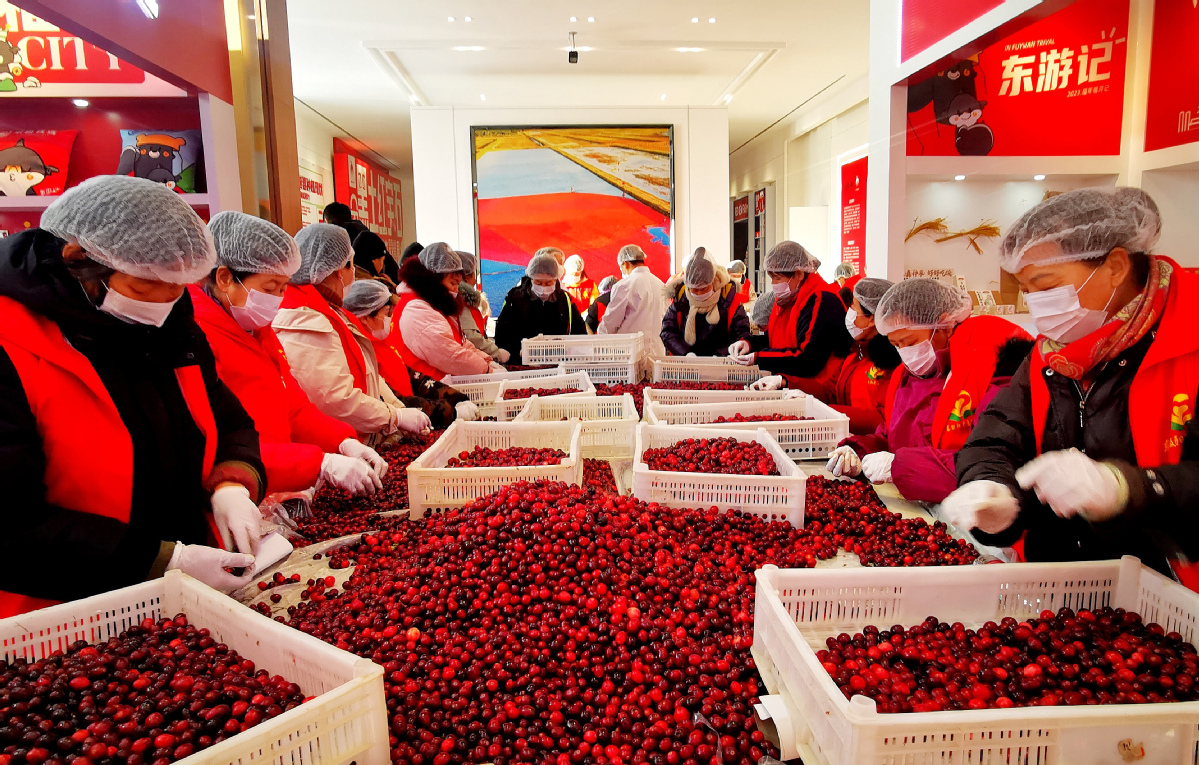Boom in travel to 'ice city' Harbin spurs sales of cranberry products
By ZHU WENQIAN | China Daily | Updated: 2024-01-17 09:27

The tourism business in Northeast China, led by "ice city" Harbin, capital of Heilongjiang province, has reached a historical high during the winter season, boosting sales of several related sectors such as locally produced cranberries.
Online searches and online sales volume of cranberries, cranberry juice, jam and dried cranberries have surged in recent days.
Earlier, not many people were familiar with cranberries produced in Heilongjiang, and consumers mainly bought them for baking and embellishments in cocktails. Most stores did not even have high inventories of the previously little-known fruit.
But retailers have had to urgently restock, as sales of cranberries surged following livestreaming sessions, industry players said.
When a group of children from Nanning, Guangxi Zhuang autonomous region, went on a study tour to Northeast China in early January, they received a warm welcome in Harbin and Mohe, the northernmost city in China.
Touched by the response of Heilongjiang residents, who had taken good care of the students, Guangxi sent truckloads of honey mandarins to Harbin to express its gratitude.
In return, Heilongjiang sent 100,000 boxes of premium cranberries to Guangxi. The gesture went viral online, fueling the popularity of cranberries.
The departments of commerce in Guangxi and Heilongjiang are now discussing business opportunities to promote special local products.
"Our warehouse has reported a shortage of fresh cranberries. It is expected that based on the current booming sales, it will run out of stocks by the end of the month," said Dang Linguang, director of Ganfuyuan, a store for cranberries on Alibaba's e-commerce platform Taobao.
Dang said his store serviced more than 500 orders for cranberries on Jan 7 and over 1,000 orders on Jan 8 following the newfound popularity of the fruit.
The area extending from China's easternmost city of Fuyuan in Heilongjiang to Heihe on the Russian border is Asia's largest cranberry producing area. The Greater Hinggan Mountains in Northeast China have been a major production area of cranberries, and domestic cranberries are only grown in some parts of the province.
In 2023, the output of cranberries at the base reached 2,700 metric tons, up 5.88 percent year-on-year.
Still, the domestic supply of cranberries in China does not meet the demand, and the country mainly imports cranberries from the United States, Chile and Canada, according to the local government.
Cranberries mainly grow in cold regions, and the main sales season falls between September and December.
They generally grow at the foot of mountains and near acidic lakes, swamps or ponds, industry players said.
"Cranberries prefer cool environments and require moist peat soil, as this kind of soil has good air permeability and drainage, which can meet the large-scale water harvesting requirements of cranberries," Dang said.
The travel boom in Harbin, market experts said, will help promote local consumption and draw the attention of more Chinese consumers to Northeast China.
The craze for the "ice city" and related online marketing events are similar to the popularity of Zibo barbecue and Guizhou province's popular Village Basketball Association. It has become a phenomenon, said Li Yang, associate professor of marketing at the Cheung Kong Graduate School of Business.
"Harbin is a large market, and it has more to offer beyond winter travel consumption. On a more macro level, the overall consumption recovery after the COVID-19 pandemic depends on residents' consumption confidence and expectations for potential income growth," he said.
zhuwenqian@chinadaily.com.cn
























